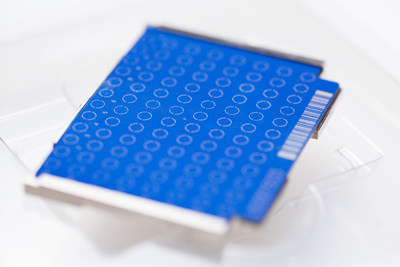Bruker Corporation Introduces Important MALDI Biotyper Enhancements At ECCMID 2016: New Disposable MBT Biotargets 96, MBT Subtyping And Carbapenem Resistance Tests
AMSTERDAM, April 11, 2016 /PRNewswire/ -- At the 26th European Congress of Clinical Microbiology and Infectious Diseases (ECCMID), Bruker (Nasdaq: BRKR) introduces enhancements to the MALDI Biotyper (MBT) routine microbial identification workflow, and high-value expansions of the MBT assay menu to strain subtyping and to antimicrobial resistance testing for clinical and microbiology research:

1. MBT Biotargets 96Further Improve Microbiology Laboratory Efficiency and Quality with Individually Bar-coded, Easy-to-Use and Time-saving Disposable MALDI Sample Targets
The disposable MBT Biotargets 96 further improve laboratory efficiency for the MALDI Biotyper workflow. They have 96 sample spots and can be disposed of after all spots have been utilized. The novel MBT Biotargets 96 use proprietary AnchorChip technology for exact sample positioning and maximum sensitivity. The targets are individually bar-coded, providing sample traceability for each MALDI Biotyper run, and their unique material offers optimal flatness and product integrity. The MBT Biotargets 96 are now available for European clinical customers, following IVD directive EC/98/79.
2. Rapid, New MBT Subtyping Module for Research Use Only (RUO)
The MBT Subtyping Module enables fast detection of selected antibiotic-resistant strains in Bacteroidesfragilis and Staphylococcusaureus isolates. Identification and resistance detection is performed in a single automated analysis, providing species identification followed by selected resistance information. For B. fragilis, as the most prevalent species of the Bacteroides genus, the MBT Subtyping Module automatically detects carbapenemase producing strains that carry the cfiA gene.
For S. aureus the MBT Subtyping Module detects strains carrying the mecA cassette expressing the PSM protein. For this resistance mechanism, the new test can differentiate MRSA (methicillin-resistant Staphylococcus aureus) from MSSA (methicillin-sensitive Staphylococcus aureus) within minutes.
3. Rapid, New MBT Selected Test of Antibiotic Resistance (STAR) for Beta-lactamase (BL)
The new MBT STAR-BL assay supports the generic detection of Gram-negative carbapenemase producers, using a patented, functional beta-lactamase test for selected antibiotics. The MBT STAR-BL software (RUO) monitors mass shifts introduced by enzymatic degradation of betalactam antibiotics, such as penicillins, 3rd- generation cephalosporins and carbapenems. The MBT STAR-BL test consists of a software module for easy data analysis and the MBT STAR-BL IMI kit, which is currently in performance evaluation studies. During the evaluation, this kit is for investigational-use-only (IUO), and available for participating collaboration partners.
Professor Jens Jorgen Christensen at the Department of Clinical Microbiology at Slagelse Hospital in Denmark stated: "Carbapenemase producing enterobacteria strains are on the rise globally. Rapid recognition in risk situations is desirable for optimal antibiotic treatment of patients. The MBT STAR-BL IMI approach will be helpful for that purpose, as increased resistance can be detected in less than three hours."
Philip Perry, the Business Development Manager for Consumables at Bruker Daltonics, added: "Bruker is committed to the continuous expansion of our MALDI Biotyper platform, e.g. with enhancements of our reference libraries, increased customer convenience and expansion of the MALDI Biotyper assay menu, in order to further increase workflow ease-of-use and efficiency, and now also for rapid testing of selected antibiotic resistance mechanisms in clinical research."
About the Bruker MALDI Biotyper (MBT) Platform
The MALDI Biotyper family of systems enables molecular identification of microorganisms like bacteria, yeasts and fungi. Classification and identification of microorganisms is achieved reliably and quickly using proteomic fingerprinting by high-throughput MALDI-TOF mass spectrometry. The MALDI Biotyper uses a molecular approach based on specific proteomic fingerprints from bacterial strains. Many published studies have highlighted the greater accuracy and lower cost offered, as well as typically much faster time-to-result (TTR).
Applications of various MALDI Biotyper solutions include clinical routine microbial identification, environmental and pharmaceutical analysis, taxonomical research, food and consumer product safety and quality control, as well as marine microbiology. In many European and international laboratories the MALDI Biotyper has replaced classical biochemical testing for bacterial identification in the past few years due to the accuracy, speed, extensive species coverage, ease of use and cost effectiveness of the system. Traditional biochemical techniques detect different metabolic properties of microorganisms, can take many hours or even days for completion, and they often lack specificity.
The robust MALDI Biotyper requires minimal sample preparation and offers low consumables cost. The products of the MALDI Biotyper family are available in a research-use-only (RUO) version, as the U.S. FDA-cleared MALDI Biotyper CA System, or in an IVD-CE version according to EU directive EC/98/79. The MALDI Biotyper also has medical device registrations in numerous other countries. RUO versions of the MALDI Biotyper allow selected, high-value antimicrobial resistance tests.
About Bruker Corporation (NASDAQ: BRKR)
For more than 50 years, Bruker has enabled scientists to make breakthrough discoveries and develop new applications that improve the quality of human life. Bruker's high-performance scientific research instruments and high-value analytical solutions enable scientists to explore life and materials at molecular, cellular and microscopic levels.
In close cooperation with our customers, Bruker is enabling innovation, productivity and customer success in life science molecular research, in applied and pharma applications, in microscopy, nano-analysis and industrial applications, as well as in cell biology, preclinical imaging, clinical research, microbiology and molecular diagnostics. For more information, please visit www.bruker.com.
Photo - http://photos.prnewswire.com/prnh/20160407/353145
To view the original version on PR Newswire, visit:http://www.prnewswire.com/news-releases/bruker-introduces-important-maldi-biotyper-enhancements-at-eccmid-2016-new-disposable-mbt-biotargets-96-mbt-subtyping-and-carbapenem-resistance-tests-300248183.html
SOURCE Bruker Corporation

